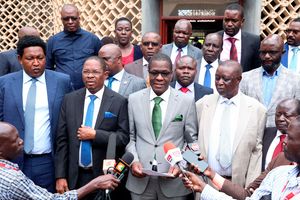Stop starving counties of funds to make them look pathetic

Council of Governors chairperson Ann Waiguru (second right) addresses journalists at Delta Corner building in Nairobi on October 6, 2022.
What you need to know:
- Funds due to the counties on the 15th of every month hardly ever get remitted, putting the county governments in embarrassingly precarious circumstances.
- Governor Waiguru informs us that currently, counties are owed Sh51.7 billion that should have been disbursed.
- Counties need funds to function and the National Treasury must do better than this for it to be believed to support devolution.
It will be a happy time indeed when we stop seeing the scowling faces of county governors addressing the national government with despair and anger over the delayed disbursement of funds.
But those times seem further than ever, as last Thursday, a glum-looking Chairperson Anne Waiguru was leading equally dispirited Council of Governors colleagues in demanding some Sh51.7 billion in delayed funds from the national government.
The lament was the same as we have continually heard from the governors.
Funds due to the counties on the 15th of every month hardly ever get remitted, putting the county governments in embarrassingly precarious circumstances.
The unpredictability and delays in disbursement have in the past led to paralysis of services, including virtual lockdowns of government. It was never intended to be this way at all.
Governor Waiguru informs us that currently, counties are owed Sh51.7 billion that should have been disbursed.
Twenty-seven counties are owed Sh20.3 billion for August (that is funds that should have been released on August 15).
All counties, including the 27, are owed Sh31.45 billion for the September allocation. If nothing will have been released by September 25, the outstanding debt will escalate by another Sh29.6 billion.
Conditional allocation
There is more. Counties are owed another Sh27.68 billion in conditional allocation carried over from the year that ended in June 2022, and another Sh37 billion for the current year remains outstanding because Parliament is yet to pass the County Governments Additional Allocation Bill, 2022.
Counties need funds to function and the National Treasury must do better than this for it to be believed to supporting devolution. Lacking that, accusations that it is out to sabotage devolution will remain very attractive.
Like the national government, county governments have to pay salaries, buy medicines, direct some little resources towards development, buy petrol and pay other bills, etc.
A lot of these are not happening, a factor complicated further by the reality of transition.
Transitions are terrible times for routine and continuing projects. The movement in and out of offices provides perfect grounds for pilferage and sloth, a lot of which we are seeing.
The national government is at a standstill, with huge uncertainties about careers. Very few officers are working or appearing to be working.
We know that there are presidential decrees that no sizeable amounts of cash should be paid without layers of approval from the Treasury, which itself is unlikely to do anything without authority from the Presidency.
Are counties victims of such edicts? They should not be and President William Ruto, who has sworn to fully support devolution, should order a release of these funds to the counties.
These new governors are expected to complete ongoing projects and start implementing their own manifestos. They cannot and that is unacceptable.
It is unacceptable also that as the country ushers in the third county governments, issues of disbursements are still dominating discussions between the national and the devolved governments.
We should be discussing the devolution of more functions to counties to allow for even more resources to be moved.
We should be asking the counties how efficiently they are executing the 14 functions they are responsible for. We should, by now, have sealed most of the loopholes that governors have been using to loot funds.
The fact that we have not leads me to believe that this situation is not accidental. It is a well-known fact that one way of avoiding confronting tough realities is to create a crisis that diverts attention.
Counties have been made to be crisis centres – seen as hubs of corruption and inefficiency.
Governors spend a lot of time answering audit queries, which they should as they are accountable. But this cannot be the most important assignment for them.
Audit queries
Those that do not have audit queries should be facilitated to continue working. Perhaps a mechanism should be introduced that allows the disbursement of resources to counties according to how efficiently they are used.
In this way, we will not have all 47 governors complaining. A more proactive and enabled Senate would also add critical oversight over counties and avoid the accumulation of unresolved issues that only make devolution look bad and ill-conceived.
Ten years down the road, an honest report card would return an average score for devolution and there is no greater indictment for this than the endless cry from counties for funds.
The fact that there have been some really horrible governors in the past does not dilute the near-unanimous acceptance that devolution was one of the best rewards of the 2010 Constitution.
President Ruto must streamline the funds' disbursement issue with finality and let devolution deliver on its promise.
Mr Mshindi, a former Editor-in-Chief of Nation Media Group, is now consulting. [email protected]; @TMshindi





